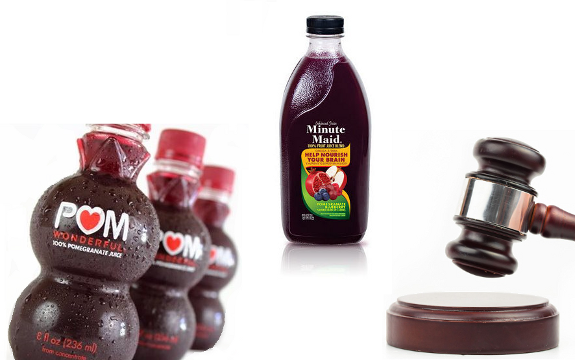Supreme Court Sides with POM Wonderful in Coca-Cola Lawsuit

 Now more than ever, consumers are getting more savvy when it comes to their food labels. We realize that food producers are in the sales business and use marketing to impress us with their color choice, font, images, and words. But many of these marketing tactics can be misleading, which is what juice maker POM Wonderful alleges of Coca-Cola Co. Fortunately for POM, a recent ruling from the Supreme Court says the company can pursue a lawsuit against Coke, one which accuses the soft-drink maker of pulling business right from under POM and doing so by misleading the public.
Now more than ever, consumers are getting more savvy when it comes to their food labels. We realize that food producers are in the sales business and use marketing to impress us with their color choice, font, images, and words. But many of these marketing tactics can be misleading, which is what juice maker POM Wonderful alleges of Coca-Cola Co. Fortunately for POM, a recent ruling from the Supreme Court says the company can pursue a lawsuit against Coke, one which accuses the soft-drink maker of pulling business right from under POM and doing so by misleading the public.
As I reported in April, the lawsuit says Coca-Cola used misleading tactics when labeling their Minute Maid Pomegranate Blueberry juice blend. While POM’s juice is 85 percent pomegranate juice and 15 percent blueberry, the Coca-Cola version only has 0.5 percent pomegranate and blueberry juices combined.
POM says Coca-Cola swiped their customers, tricking them into thinking they were getting a comparable product at only a fraction of the price.
Despite being called Pomegranate Blueberry juice blend and having photos of pomegranates, blueberries, apples, and grapes on the front, the Minute Maid blend is actually mostly (99 percent) apple and grape juices.
Two lower courts had previously ruled against POM, siding with Coke who said its label complies with the Federal Food, Drug and Cosmetic Act, and they are protected against POM’s suit by the Lanham Act. The Supreme Court, however, disagreed.
Read: Pomegranate Juice Significantly Improves Memory in Recent Study
As NPR reports:
“Summarizing the decision from the bench, Justice Anthony Kennedy said that ‘the position Coca-Cola takes in this court’ is that because it complied with the Food and Drug Act’s labeling requirements, it could ‘mislead and trick consumers’ without being subject to liability.
That assertion, he said, is ‘incorrect.’ The Lanham Act and the Food and Drug Act are supposed to work together: The former allows competitors to bring civil lawsuits to protect their commercial interests from unfair competition, while the latter protects public health and safety. To the extent that they both cover labels, Justice Kennedy said, FDA regulations are not a ceiling that insulates companies from being sued by competitors.”
For POM, this means they can continue with the suit, which will go to trial if not settled beforehand. While they are celebrating their victory, the company is named as a defendant itself in another suit, one filed by the Federal Trade Commission, who is demanding POM stop advertising health benefits without clinical trials to back those claims.
